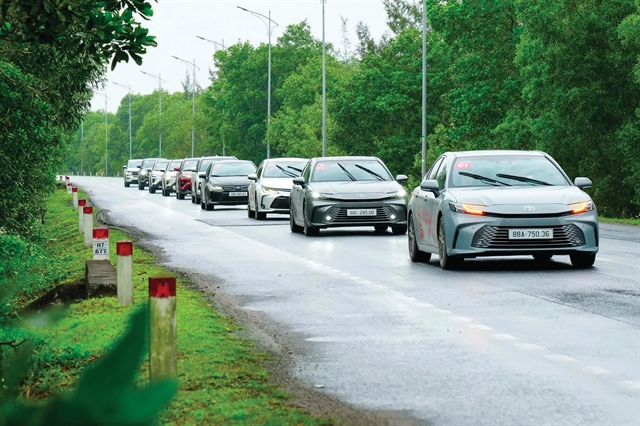HÀ NỘI — Hybrid vehicles are emerging as a bright spot in the automotive market, with new tax incentives expected to accelerate adoption and encourage domestic production in the coming years.
According to the Việt Nam Automobile Manufacturers’ Association (VAMA), more than 9,700 hybrid cars were sold in the first nine months of 2025 – a 73 per cent increase year-on-year. The real figure is likely higher, as several major brands such as Haval, BYD, Volvo, Lexus, Mercedes-Benz and BMW do not disclose detailed hybrid sales.
This surge reflects a strong shift in consumer preference towards greener mobility options. There are now around 20 hybrid models available in Việt Nam, ranging from mass-market to luxury brands. The most popular segment – hybrid cars priced between VNĐ600 million and VNĐ900 million – has seen particularly strong growth, driven by affordability and lower operating costs.
Manufacturers have also helped boost consumer confidence by extending battery warranties to as long as seven years or 150,000 kilometres, while battery replacement costs have dropped to between VNĐ60 million and VNĐ75 million.
Tax incentives to drive affordability
The momentum is expected to grow even stronger from January 1, 2026, when the revised Law on Special Consumption Tax takes effect. Under the new law, all hybrid vehicles – both self-charging (HEV) and plug-in (PHEV) – will be taxed at 70 per cent of the rate applied to conventional petrol cars.
Currently, only PHEVs enjoy this preferential rate, while HEVs are taxed the same as petrol or diesel cars. The upcoming change means hybrid cars will become significantly cheaper. Lower special consumption tax, along with reduced registration fees, results in overall savings of up to several hundred million đồng per vehicle for consumers.
VAMA estimates that although tax revenue may drop by about VNĐ5 trillion per year from 2026–2030, this will be offset by savings of VNĐ26 trillion in fuel costs and VNĐ28 trillion in crude oil imports over the vehicles’ lifetimes.
Despite rising demand, all hybrid cars currently sold in Việt Nam are imported. The new tax incentives, however, could pave the way for local assembly and production, which would strengthen Việt Nam’s automotive supply chain and create new jobs.
Toyota Việt Nam has already announced plans to assemble hybrid cars locally. At its 30th anniversary celebration, General Director Nakano Keita revealed that the company will modernise its headquarters and factory in Phúc Yên, Phú Thọ Province, and begin production of its first hybrid model with an investment of over US$360 million.
Other manufacturers are also expected to follow suit, given the segment’s strong growth potential. Hybrids currently account for only about 2.5 per cent of total vehicle sales nationwide, leaving ample room for expansion as consumers seek more sustainable mobility options.
Beyond consumer savings, hybrid cars promise broader economic and environmental gains. According to VAMA, an increase in hybrid adoption could help reduce national CO₂ emissions by more than 2.6 million tonnes, saving the equivalent of VNĐ333 billion in carbon credits. The shift would also enhance energy security and maintain a stable investment climate for the automotive industry.
The Ministry of Finance has reaffirmed that the new tax framework aligns with Việt Nam’s green growth strategy.
Deputy Minister Cao Anh Tuấn explained that the forthcoming decree on the special consumption tax will apply a 70 per cent rate to vehicles combining petrol with electricity or biofuel, provided their fuel consumption does not exceed 70 per cent of the average for comparable petrol cars.
The ministry will coordinate with the Ministry of Construction – which oversees the classification of environmentally friendly vehicles – to publish benchmark fuel consumption data annually, starting in late 2025.
Industry experts say this policy signals a clear direction: supporting energy-efficient and low-emission vehicles while creating opportunities for Việt Nam to participate more deeply in the global green automotive supply chain.
As the country moves closer to its net-zero 2050 target, hybrid vehicles – combining efficiency, affordability and reduced emissions – are poised to play a central role in driving the next chapter of Việt Nam’s green mobility transition. — VNS
Copyrights 2012 Viet Nam News. All rights reserved.
Add:79 Ly Thuong Kiet Street, Ha Noi, Viet Nam. Editor_In_Chief: Nguyen Minh
Tel: 84-24-39332316 – Fax: 84-24-39332311 – E-mail: vnnews@vnagency.com.vn
Publication Permit: 13/GP-BVHTTDL.











